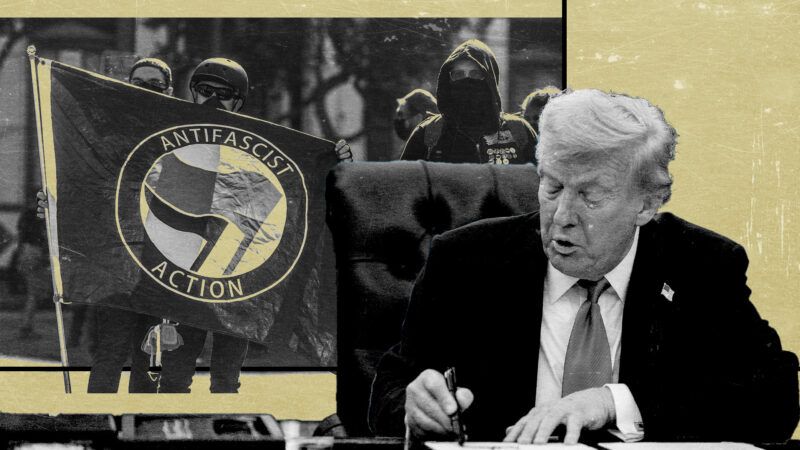Trump's Executive Order Against 'Political Violence' Is an Un-American Attack on Free Speech
The order lists "anti-Americanism, anti-capitalism, and anti-Christianity" as common threads among "domestic terrorists," though all are protected by the First Amendment.

Last week, President Donald Trump issued an executive order that purports to address the recent spate of political violence. But the order is remarkably one-sided, taking the apparent position that only leftists can be violent, and it treats speech clearly protected by the First Amendment as evidence of criminal behavior.
"Heinous assassinations and other acts of political violence in the United States have dramatically increased in recent years," according to the order, titled "Countering Domestic Terrorism and Organized Political Violence." It cites multiple recent events as examples—including the murder of Charlie Kirk, the foiled 2022 assassination plot against U.S. Supreme Court Justice Brett Kavanaugh, and last week's shooting at a U.S. Immigration and Customs Enforcement (ICE) facility.
"This political violence," it continues, "is a culmination of sophisticated, organized campaigns of targeted intimidation, radicalization, threats, and violence designed to silence opposing speech, limit political activity, change or direct policy outcomes, and prevent the functioning of a democratic society."
Notably, the order only lists violence against conservatives or targets favored by conservatives; it does not mention the June shooting of two Democratic Minnesota lawmakers, one of whom died. It also elides the fact that in the shooting of an ICE facility, the only victims were migrants in custody.
The order also uses padded statistics, citing "a more than 1,000 percent increase in attacks" on ICE officers "since January 21, 2025, compared to the same period last year." But that represents a starting point of very few alleged assaults last year, and the increase seems largely to be a result of minor scuffles taking place during ICE enforcement actions.
Perhaps most troubling of all, though, the executive order lists First Amendment-protected speech as evidence of criminality that requires federal intervention.
"These movements portray foundational American principles (e.g., support for law enforcement and border control) as 'fascist' to justify and encourage acts of violent revolution," the order claims. "This 'anti-fascist' lie has become the organizing rallying cry used by domestic terrorists to wage a violent assault against democratic institutions, constitutional rights, and fundamental American liberties. Common threads animating this violent conduct include anti-Americanism, anti-capitalism, and anti-Christianity; support for the overthrow of the United States Government; extremism on migration, race, and gender; and hostility towards those who hold traditional American views on family, religion, and morality."
Regardless of one's view on "anti-fascism" in its current usage, this entire paragraph is an assault on the First Amendment. Terms like extremism and hostility are amorphous and mostly exist in the eye of the beholder. "Support for the overthrow of the United States Government" gets closer to an actionable claim, but not that close: The Alien Registration Act of 1940, also known as the Smith Act, made it a crime "to knowingly or willfully advocate, abet, advise, or teach the duty, necessity, desirability, or propriety of overthrowing or destroying any government in the United States by force or violence."
But the U.S. Supreme Court later narrowed that statute to explicit calls to action, not just abstract expressions of opinion. The court further established in 1969's Brandenburg v. Ohio that the government could not criminalize incitements to violence "unless this advocacy is directed to inciting or producing imminent lawless action and is likely to incite or produce such action."
That leaves the order's contention that "domestic terrorists" are characterized by "anti-Americanism, anti-capitalism, and anti-Christianity." One can oppose all of these traits, but they are unquestionably protected by the First Amendment. It is not illegal to criticize America, or capitalism, or Christianity—in fact, so long as it doesn't cross over into "imminent lawless action," it's perfectly legal to criticize anything or anyone.
Most of all, the order is designed to target people Trump and his supporters don't like, lumping them all together as members of an "anti-fascist" movement. It's especially galling, given how conservatives reacted in recent years when they were on the other side.
In 2009, the Department of Homeland Security produced a report on the dangers of "rightwing extremism" and how to look out for it. "Rightwing extremism in the United States," the report noted, "may include groups and individuals that are dedicated to a single issue, such as opposition to abortion or immigration." It further added that among other factors, "the return of military veterans facing significant challenges reintegrating into their communities could lead to the potential emergence of terrorist groups or lone wolf extremists capable of carrying out violent attacks."
At the time, Republicans denounced the report as offensive and overly broad. The report, as Reason's Jesse Walker wrote at the time, "treated 'extremism' itself as a potential threat, while offering a definition of extremist so broad it seemed it include anyone who opposed abortion or immigration or excessive federal power."
Now that Republicans are in power, they're apparently quite comfortable wielding that exact same sort of power against their political opponents.
It's ironic that Trump's executive order inveighs against "anti-Americanism." By so openly targeting protected speech for reprisal, the order is itself quite un-American.


Show Comments (105)